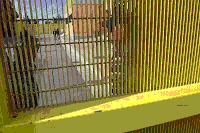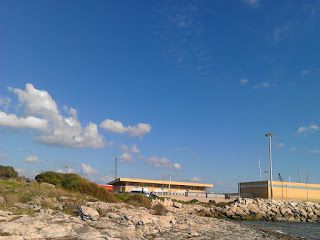The Milo CIE (Immigration Detention Centre): the horror continues
.bmp) On 19 February some members of the associations borderline-europe and Borderline Sicilia visited the Immigrant Detention Centre (CIE) in Milo, a short distance from the city of Trapani.
On 19 February some members of the associations borderline-europe and Borderline Sicilia visited the Immigrant Detention Centre (CIE) in Milo, a short distance from the city of Trapani.
The situation which we met was deeply unsettling. This is largely as a result of the psychological and physical conditions into which streams of migrants are “typically” finding themselves subjected to when held in a CIE. They are being deprived of their personal freedom for an unspecified amount of time (or rather, for a period defined only ‘as a maximum of 18 months’) .
The situation which the “guests” are facing in the Milo CIE is, however, particularly difficult and unacceptable. There are many reports of people suffering from largely untreated injuries and traumas. All that is available to them in terms of medication, is aspirin and other pain killers. Within the structure there is only one doctor who works eight hours a day. We were informed by other workers within the centre that the other doctors were all fired for protesting against their dire working conditions. Members of borderline-europe have been able to verify the excessive amount of pain killers and tranquilisers which are being administered in order to “keep the CIE guests calm”, as not only other centre employees, but also members of the police and the migrants themselves, have put it. Migrants have also reported periods of drowsiness following meals.
 The food which they are provided with is of exceedingly poor quality, uncooked rice and sand in amongst the salad. In the morning they are served a glass of watered-down milk with a piece of bread. The “guests” have complained about the poor medical assistance on offer, often it takes days for them to be taken to the medical room despite showing signs of serious problems (among those being held in the centre, there are some diabetics as well as others who suffer from swollen limbs and bruising). Some of the detainees spoke of a “guest” who was practically dependent on receiving care and treatment from other people, yet this role was carried out by the migrants themselves rather than the medical staff. Even contact with social assistance is very sporadic and many must wait over two weeks to have any contact at all. Within the centre, the members of borderline-europe were able to approach the bars which separated the “guests” off. The migrants urged the visitors to enter their dormitories and take photos. Such permission, however, was not granted, despite the fact that previous agreements with the Prefecture had included this. The building itself, despite being recently built, is quite badly damaged. Some of the damage has been caused by the migrants themselves, who, due to the extreme conditions in which they are being held, have resorted to expressing their desperation and anger through acts of violence towards the building. Acts of violence are often self-inflicted as well. There have been numerous cases of self-harming which workers and doctors of the management cooperative Oasi (which currently runs Immigration Detention Centres in Modena and Bologna and is due to shortly take over the running of the second Trapani Centre, which is momentarily being restructured, Serraino Vulpitta) have confirmed.
The food which they are provided with is of exceedingly poor quality, uncooked rice and sand in amongst the salad. In the morning they are served a glass of watered-down milk with a piece of bread. The “guests” have complained about the poor medical assistance on offer, often it takes days for them to be taken to the medical room despite showing signs of serious problems (among those being held in the centre, there are some diabetics as well as others who suffer from swollen limbs and bruising). Some of the detainees spoke of a “guest” who was practically dependent on receiving care and treatment from other people, yet this role was carried out by the migrants themselves rather than the medical staff. Even contact with social assistance is very sporadic and many must wait over two weeks to have any contact at all. Within the centre, the members of borderline-europe were able to approach the bars which separated the “guests” off. The migrants urged the visitors to enter their dormitories and take photos. Such permission, however, was not granted, despite the fact that previous agreements with the Prefecture had included this. The building itself, despite being recently built, is quite badly damaged. Some of the damage has been caused by the migrants themselves, who, due to the extreme conditions in which they are being held, have resorted to expressing their desperation and anger through acts of violence towards the building. Acts of violence are often self-inflicted as well. There have been numerous cases of self-harming which workers and doctors of the management cooperative Oasi (which currently runs Immigration Detention Centres in Modena and Bologna and is due to shortly take over the running of the second Trapani Centre, which is momentarily being restructured, Serraino Vulpitta) have confirmed.
Tensions within the Centre become even more acute due to the total inactivity in which the migrants are forced to live their daily lives. There are no recreational activities on offer, not even sports activities and there are very few things that the migrants actually have the right to keep in their possession. The migrants who borderline-europe actually spoke to even said that books were forbidden for the fear that they may be used to start fires. The centre’s social workers maintain that the situation is so rigid for public security. Some members of the police, however, deny that public security is the real reason for the lack of recreational activities and instead say that it the lack of recreational activities that leads to problems of public security.
The tensions within the centre have often led to the break out of riots and a violent response from the forces of order who are responsible for the surveillance of the centre. The borderline-europe team were able to see for themselves the consequences of such outbreaks.
 This example, along with others, meant that the members of borderline-europe observed an extremely worrying situation. The situation is also complicated for the centre’s employees who have been without pay for two months. Something which obviously has a very negative effect on the way in which they carry out their work. The difficulty of controlling the situation within the centre and ensuring that the migrants receive a certain standard of dignity is evident. Furthermore, this difficulty is something which is admitted by those working on a daily basis in the centre.
This example, along with others, meant that the members of borderline-europe observed an extremely worrying situation. The situation is also complicated for the centre’s employees who have been without pay for two months. Something which obviously has a very negative effect on the way in which they carry out their work. The difficulty of controlling the situation within the centre and ensuring that the migrants receive a certain standard of dignity is evident. Furthermore, this difficulty is something which is admitted by those working on a daily basis in the centre.
borderline-europe, Borderline Sicilia ONLUS

